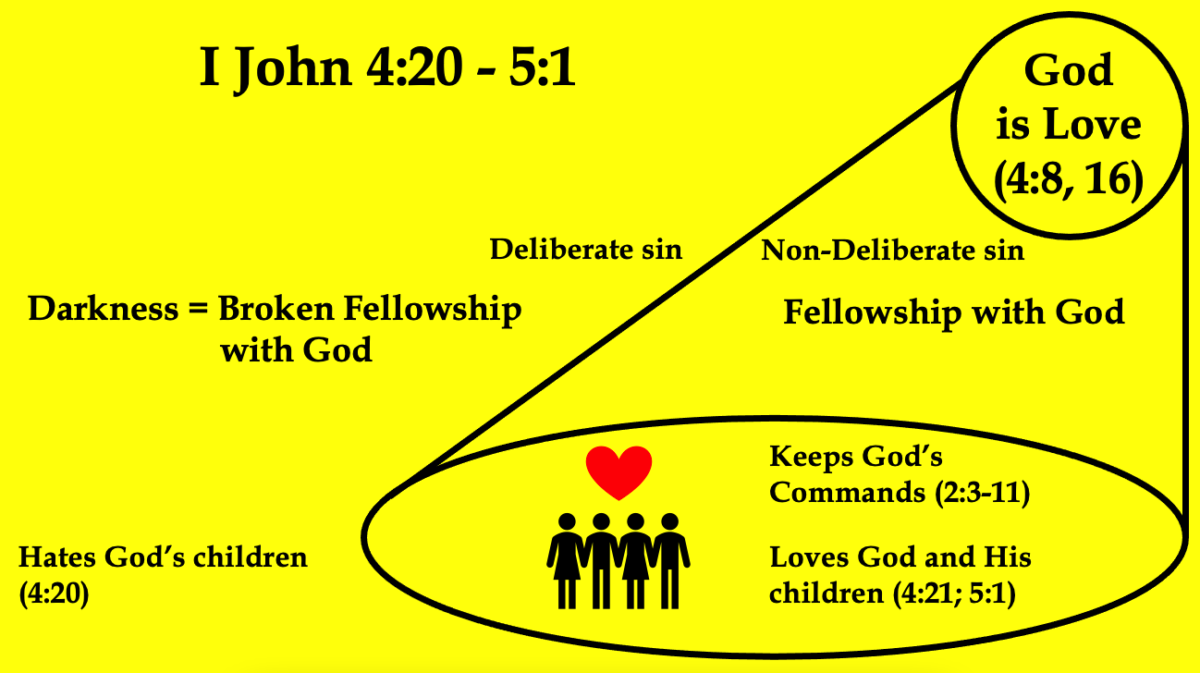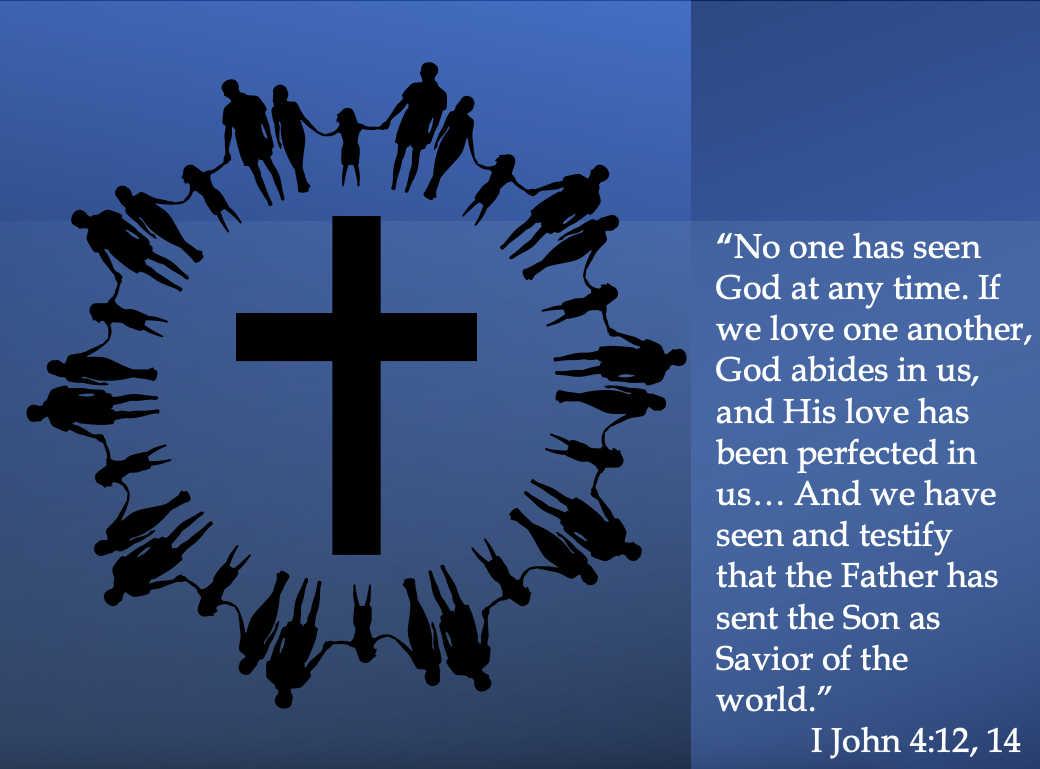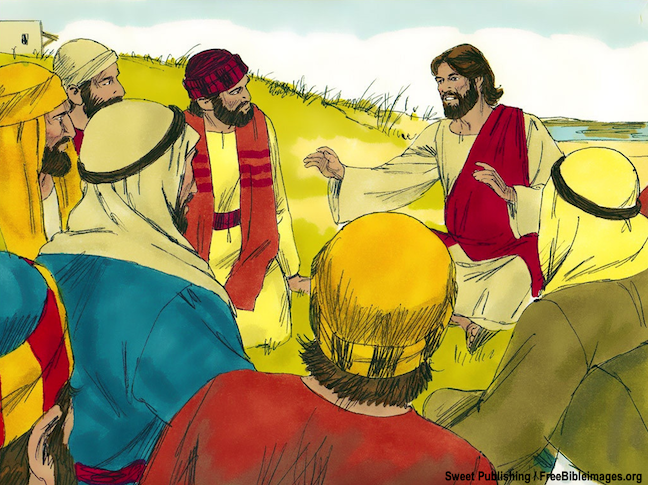“This is He who came by water and blood—Jesus Christ; not only by water, but by water and blood. And it is the Spirit who bears witness because the Spirit is truth.” I John 5:6
Like lung cancer which attacks the body’s air supply, the two primary lungs that the enemies of Christ or antichrists have attacked in the body of Christ are God’s Work (I John 5:6-9) and God’s Word (I John 5:10-13). 1 Today in our study of I John we will look at the attack on God’s Work.
Last time in our study we looked at the single act of faith in Christ at the moment of our salvation which is the victory that has overcome the world that is blinded to the gospel and opposed to people getting saved (I John 5:1-5; cf. 2 Cor. 4:3-6; 11:2-3). Just as faith provided our first victory over the world at our conversion, it can also continue to provide victory in our daily Christian lives as we rely on Christ Who lives in us through His Spirit (Gal. 2:20).
John then expounds upon the object of saving faith, namely “Jesus… the Son of God” (5:5b). The Person and Work of Jesus was vehemently attacked by false teachers during the time of John’s writings. One of those false teachings that the apostle John had to deal with was spread by Cerinthus who taught that Jesus was merely a man and the divine Christ descended on the human Jesus at His baptism but left Him when He hung on the cross to die. Thus, according to Cerinthus, only the human Jesus died and rose from the dead, not the divine Christ. 2
The apostle John refers to “Jesus… the Son of God“ (5:5b) in verse 6: “This is He who came by water and blood—Jesus Christ; not only by water, but by water and blood. And it is the Spirit who bears witness because the Spirit is truth.” (I John 5:6). The “water” refers to the baptism of Jesus Christ by John the Baptist in the Jordan River which inaugurated the public ministry of the Messiah-God (cf. Matt. 3:13-17; Mark 1:9-11; Luke 3:21-22). 3 The “blood” represents the sacrificial death of Christ on the cross when darkness covered the land, the earth quaked, and the temple veil split in two (Matt. 27:45, 51). 4
When John says, “it is the Spirit who bears witness” he is referring to the role that God the Holy Spirit had at Christ’s baptism. Matthew informs us that when Jesus came up out of the water, John the Baptist saw “the Spirit of God descending like a dove and alighting upon” Jesus (Matt. 3:16). John wants his readers to understand that the Spirit of God is not the same as the divine Christ. The Holy Spirit was a “witness” to Jesus at His baptism (I John 5:6b), but He remains a distinct Person not to be identified as the Christ. 5
In addition, the Holy Spirit’s “witness” is reliable “because the Spirit is truth”(5:6c), much like the statement, “God is love.” The very nature and character of the Spirit is to be truthful so His testimony can be trusted. 6 John affirms that the Spirit is reliable—He “is truth” – and this is because His testimony follows the Biblical law of verification which required two or three witnesses (cf. Deut. 17:6; 19:15; Matt. 18:16; John 8:17-18). 7
We also know from Matthew’s account of Jesus’ baptism that God the Father spoke from heaven, saying, “This is My beloved Son, in whom I am well pleased.” (3:16-17). Not only did the God the Holy Spirit testify at Christ’s baptism, but so did God the Father.
“The Holy Spirit was not the divine Christ coming upon Jesus, the man. The Spirit was distinct from Christ and came upon the God-Man, Jesus Christ.” 8
Considering I John 5:6 and other verses in I John, we can ascertain what the antichrists believed about Jesus. They claimed that Jesus was not the “Christ,” the Messiah-God (cf. I John 2:22). They may have taught that He was a spirit being, rather than fully God and fully human, who descended upon Jesus at His baptism but abandoned Him to die alone on the cross (I John 5:6). Hence, according to these false teachers, the work of the Cross was not a sufficient sacrifice offered up by God’s Son, but the death of a mere man which had no saving value. 9
According to this false teaching, those who believed that Jesus is the Christ would then be believing a falsehood. Hence, they were not born of God, as the apostles taught that they were (I John 5:1). This was a serious challenge to Christianity. If the false teachers believed Jesus is not the Son of God (cf. 5:5), then there was no victory over the world through faith at conversion (cf. 5:4-5). Nor was there any hope of continued victory over the world in their Christian lives. 10
John refutes such false notions and establishes that saving faith is found in one Person, “Jesus Christ,” Whose public ministry began at His “water” baptism and ended when His “blood” was shed on a cross for all the sins of the world. The apostle then writes, “7 For there are three that bear witness: 8 the Spirit, the water, and the blood; and these three agree as one.” (I John 5:7-8). 11 Through Christ’s baptism (“the water”) and His death on the cross (“the blood”),God gave testimony to the truthfulness of His Son and His mission. The third witness is “the Spirit,” Who confirms on the inside what God does on the outside. 12
“The Spirit’s witness may be thought of as coming through the prophets (including John the Baptist). The Spirit’s witness, then, was augmented by the historical realities involved in ‘the water’ and ‘the blood.’ Both the baptism and the crucifixion of Jesus are strongly attested historical facts (cf. John 1:32-34; 19:33-37). All three witnesses (‘water’ and ‘blood’ are personified) ‘are in agreement’ that a single divine Person, Jesus Christ, was involved in these events.” 13
“Behind John’s words stands the fact that at the baptism God declared, ‘This is My beloved Son, in whom I am well pleased’ (Matt. 3:17). John the Baptist personally ‘bore witness’ to this event (cf. John 1:32-34). In addition, the crucifixion was foreseen by the Scriptures (cf. John 13:18; 19:24, 28, 36, 37) and was attested by apostolic witnesses (John 19:35; 21:24, note the words ‘we know). Thus, the water and the blood are fully attested in their own right, both by divine testimony and by witnesses.” 14
“In a court of law, the Holy Spirit would be put on the stand as a character witness; the water and the blood would be entered as Exhibit A and Exhibit B. All three gave credibility to the Person and Work of our Lord and Savior Jesus Christ. If a case among men is established by the word of two or three witnesses (Matt. 18:16), then two or three divine witnesses should be even more reliable: the Spirit, the water, and the blood.” 15
In the next verse John will look back at the testimony mentioned in 5:7-8 and forward to the witness of God in 5:11-12: “If we receive the witness of men, the witness of God is greater; for this is the witness of God which He has testified of His Son.” (I John 5:9). The phrase, “If we receive the witness of men,” refers back to the requirement of two or three witnesses for the statement to be considered valid (5:7-8). The idea is since we do receive human testimony as valid under certain conditions, how much more are we to receive “the witness of God” which is far “greater.” 16
“A basic principle of God’s Word is that a ‘matter must be established by the testimony of two or three witnesses’ (2 Cor. 13:1; see Deut. 19:15). The tragic truth is that in spite of the threefold testimony God has provided (5:6-8), too many believe man rather than God.” 17
In John’s day (and ours) many people believe the false teachers’ witness (man’s) instead of God’s witness (the Spirit, water, and blood) concerning the Person and Work of Jesus Christ. Through Christ’s baptism (“the water”) and His death on the cross (“the blood”),God’s “Spirit” bore witness to the identity of God’s Son, Jesus Christ, so that whoever believes in Him may have everlasting life and complete forgiveness of their sins (I John 5:10-13; cf. John 3:14-16; 20:31; Acts 10:43; Ephes. 1:7; Col. 2:13-14).
Unfortunately, today we have many teachers who deny that Jesus is the Christ, the Son of God (I John 2:22; 5:5-8) or they deny He paid the full penalty for all our sins (John 19:30). Regarding the latter, there are people who trust their good works alone to get them to heaven and basically are saying that Christ failed to pay any of their sin debt when He died on the cross, so they must pay it all with their good works. There are others who trust Christ plus their good works who are saying that Jesus only paid part of their sin debt, but they must pay the remainder. Those who fall in these two categories are listening to the testimonies of humans instead of the testimony of God.
God testifies that Christ paid our sin debt in full so all we must do is believe or trust in Jesus alone (not our good works, good life, or religion) for His gift of eternal life (I John 5:1, 9-13; cf. John 3:14-16; 19:30; 20:31). John writes, “And He Himself is the propitiation for our sins, and not for ours only but also for the whole world.” (I John 2:2). The word “propitiation” refers to the satisfaction God the Father felt when Jesus paid the penalty for all our sins (John 19:30). God’s holy demands were satisfied when He looked at the “Righteous” One’s nail-pierced hands on the cross. Jesus paid the penalty we deserved (“death” – Rom. 6:23b) in full when He took our place on the cross.
Those who are trusting in their good works or in Christ plus their good works to get them to heaven, are telling God the Father that Jesus’ death on the cross failed to pay their sin debt in full. However, since God was forever satisfied with His perfect Son’s payment for the sin of the world (Isaiah 53:11; John 19:30; I John 2:2), we must also be satisfied with what satisfies God. God cannot accept anything we do as payment for our sins because He has already accepted His Son’s payment for all our sins when He died in our place on the cross.
Please understand that although Jesus Christ died for all people (I John 2:2; I Tim. 2:5-6), not all people will be saved and go to heaven. We must believe the gospel of Jesus Christ which says Christ died for our sins, was buried, and rose from the dead so that “whoever believes in Him should not perish but have everlasting life.” (John 3:16b; I Cor. 15:3-6). If you are not sure you have eternal life and a future home in Jesus’ heaven, Christ invites you right now to believe in Him alone for His free gift of eternal life.
To “believe in” (pisteuōn eis) Jesus means to be persuaded that He is speaking the truth and is therefore worthy of your trust. 18 If you are convinced Jesus is telling truth in John 3:16 and is therefore worthy of your trust, then believe or trust Christ alone (not your good life, prayers, or religion) to give you His gift of everlasting life. When you believe in Christ for His free gift of eternal life, you can be just as certain of heaven as the people who are already there. Knowing we are going to heaven is not a guess; it is a guarantee from Jesus Christ (John 14:1-3).
Another way the enemies of Christ attack God’s work is seen in its assault on God’s work in creation. The world teaches that we arrived by chance into this world and only the evolutionary forces of the natural world created human beings.
Anderson writes, “It’s interesting, but the Ph.D.’s in biology on our university campuses won’t even come to the debates on evolution anymore because they realize their theory is more religion than science.” 19
“It always amused me that they call evolution a theory and treat it like a fact. According to the scientific method, it doesn’t even qualify as a good hypothesis. Why? Because in the scientific method we must begin with an observation. And the most important observation for evolutionary theory has never been made—a positive mutation from a lower species to a higher. Of course, for evolution from the primordial mess to human mass we need tentontrillion positive mutations going from lower to higher. We have never observed even one. For Newton to come up with his law of gravity, he first observed the apple falling from the tree. Positive mutations, which are very rare, within a species do not count.” 20
But the Bible is clear that God created the heavens and the earth (Gen. 1:1), including human beings (Gen. 1:26-27). We know that Jesus believed in the Genesis creation account (Matt. 19:4-5) and so did the prophet Malachi (Mal. 2:15) and the apostle Peter (2 Pet. 3:4-5).
The day is coming when there will be an unprecedented judgment by God upon the world known as the Tribulation period (Rev. 6-19). Prior to John’s description of this severe judgment, there is a parenthetical break in heaven where we discover why the Lord will judge the earth. “You are worthy, our Lord and God, to receive glory and honor and power; for You created all things, and by Your will they existed and were created.” (Rev. 4:11). God’s severe judgment of the earth will be just because everything belongs to the Lord Who created the earth and all its inhabitants. The Creator has every right to do with His creation as He desires, especially if it has rejected Him. 21
You do not have to face this severe judgment on the earth. God promises to remove His church consisting of all who believed in Christ for eternal life prior to the Tribulation period (Rev. 4:1-4; cf. I Thess. 1:10; 4:13-5:11; John 14:1-3; et al.).
If you do not know for sure you have eternal life, take God at His Word when He says, “These things I have written to you who believe in the name of the Son of God, that you may know that you have eternal life.” (I John 5:13). This one verse is written to “you who believe in the name of the Son of God.” Do you believe in the name of God’s Son, Jesus Christ, Who died for all your sins and rose from the dead, proving His claims to be God are true (cf. John 20:31; Romans 1:3-4; I Corinthians 15:3-6)? If you do, the Bible guarantees “you may know that you have eternal life.” It does not say you may “think” or “hope” or “guess” you have eternal life. It says you may “know” with absolute certainty that eternal life is yours. Because Jesus Christ is “the truth” (John 14:6) and cannot lie (Titus 1:2; Hebrews 6:18), you can be confident He will keep His promise of eternal life to all who believe in Him (cf. John 3:15-16).
Do you now know for sure you have eternal life and a future home in Jesus’ heaven? If you do, you can tell God this through prayer.
Prayer: Dear Lord God, thank You so much for providing a threefold witness to Your Son, Jesus Christ, through the Holy Spirit, Christ’s water baptism, and His shed blood on the cross for all my sins. I acknowledge that I have been deceived by false teachers in the past regarding Jesus’ true identity and the way to heaven. Thank You for revealing the truth to me about Your Son. I now come to You as a sinner who cannot save himself. I believe Jesus is the Christ, the Son of God, Who died in my place on the cross and rose from the dead. As best I know how, I am now believing or trusting in the Son of God, Jesus Christ alone (not my good life, my religion, or my prayers), to give me everlasting life and a future home in His heaven. Thank You for the everlasting life I now have and that I will not have to face the terrible judgment that is coming upon the world during the Tribulation period. Please use me now to tell others about Jesus and His free offer of everlasting life so they may also escape the coming Tribulation judgment and the horrific eternal judgment that will follow. In the mighty name of the Lord Jesus Christ, I pray. Amen.
ENDNOTES:
1. David R. Anderson, Maximum Joy: I John – Relationship or Fellowship? (Grace Theology Press, 2013 Kindle Edition), pg. 238.
2. See Zane C. Hodges; Robert Wilkin; J. Bond; Gary Derickson; Brad Doskocil; Dwight Hunt; Shawn Leach; The Grace New Testament Commentary: Revised Edition (Grace Evangelical Society, Kindle Edition, 2019), pg. 602; Tom Constable, Dr. Constable’s Notes on 1 John, 2022 Edition, pg. 109 cites Zane C. Hodges, The Epistles of John: Walking in the Light of God’s Love (Irving, Tex.: Grace Evangelical Society, 1999), pg. 219, footnote 10.
3. Hodges, The Grace New Testament Commentary, pg. 602; Zane C. Hodges, The Bible Knowledge Commentary Epistles and Prophecy, Editors John F. Walvoord and Roy B. Zuck (David C. Cook, 2018 Kindle Edition), Kindle Location 4045 to 4050.
4. Tony Evans, CSB Bibles by Holman, The Tony Evans Bible Commentary (B & H Publishing Group, Kindle Edition, 2019, pg. 2951.
5. Hodges, The Grace New Testament Commentary, pg. 602.
6. Ibid.
7. Ibid.
8. Anderson, Maximum Joy, pg. 238.
9. Hodges, The Grace New Testament Commentary, pg. 602.
10. Ibid.
11. The NKJV of I John 5:7-8 reads, “7 For there are three that bear witness in heaven: the Father, the Word, and the Holy Spirit; and these three are one. 8 And there are three that bear witness on earth: the Spirit, the water, and the blood; and these three agree as one.” It is important to acknowledge that the words from “in heaven” (5:7) to “on earth” (5:8) are “well known because they were first introduced into an early printed edition of the Greek New Testament by Erasmus. They then became part of the KJV, but they are not found in the vast majority of the surviving Greek manuscripts of 1 John,” (Hodges, The Grace New Testament Commentary, pg. 602). Hence, these words are omitted in the text.
12. Evans, The Tony Evans Bible Commentary, pg. 2951.
13. Hodges, The Bible Knowledge Commentary Epistles and Prophecy, Kindle Location 4054 to 4059.
14. Hodges, The Grace New Testament Commentary, pg. 603.
15. Anderson, Maximum Joy, pg. 239.
16. Hodges, The Grace New Testament Commentary, pg. 603.
17. Evans, The Tony Evans Bible Commentary, pg. 2951.
18. Walter Bauer, A Greek-English Lexicon of the New Testament and Other Early Christian Literature: Third Edition (BDAG) revised and edited by Frederick William Danker (Chicago: University of Chicago Press, 2000 Kindle Edition), pg. 816.
19. Anderson, Maximum Joy, pg. 239 cites personal interview with Kirby Anderson, Trinity Pines, TX, November 17, 2001.
20. Anderson, Maximum Joy, pg. 239. 21. Ibid., pp. 239-240.















